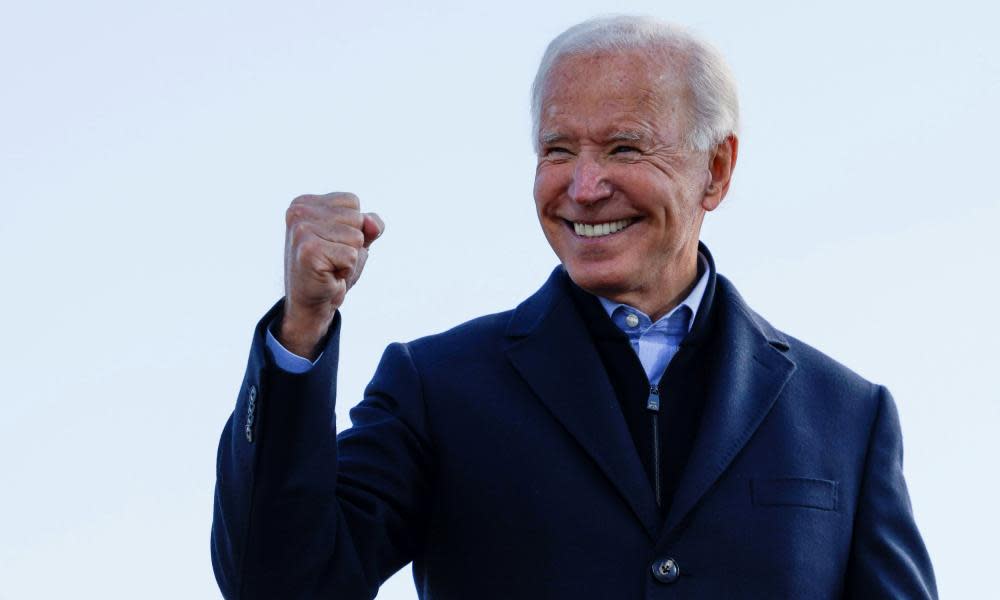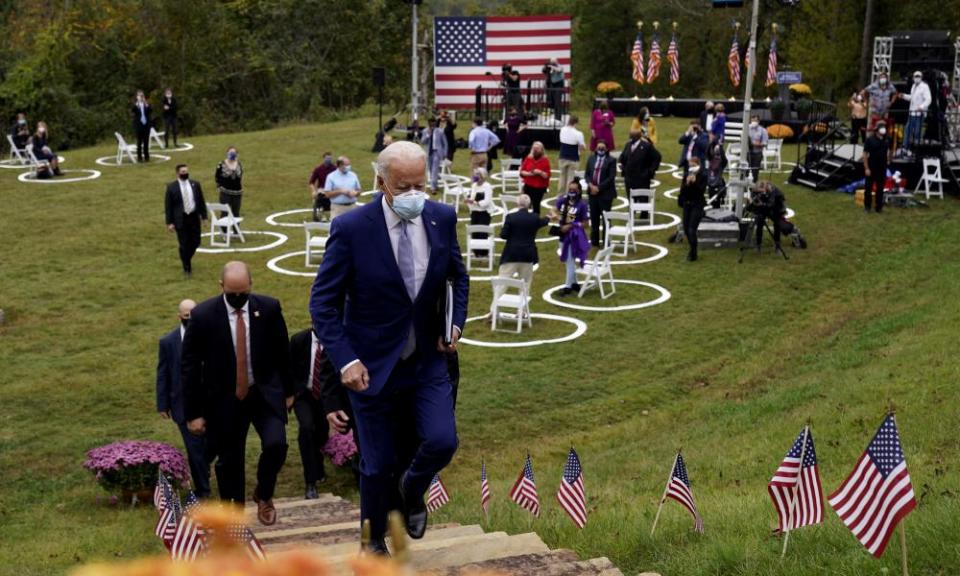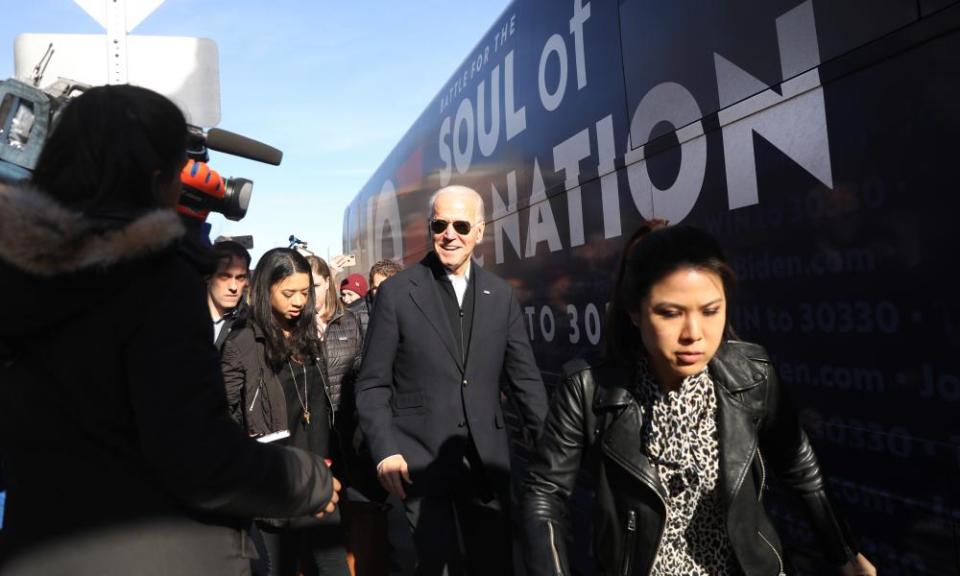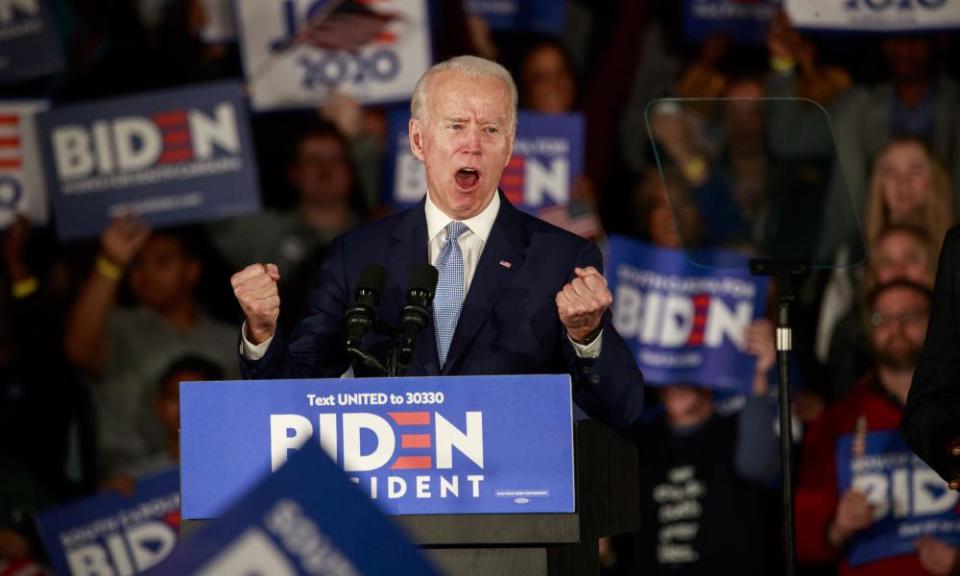Joe Biden: from a campaign that almost collapsed to fighting Trump for the presidency
- Oops!Something went wrong.Please try again later.
- Oops!Something went wrong.Please try again later.

Just days before one of the most extraordinary presidential elections in US history, the Democratic nominee, Joe Biden, finds himself flush with cash, polling ahead of Donald Trump in state and national polls, and on a bold last-minute campaign offensive in parts of the country his Republican opponent won in 2016, and would usually be able to depend on for support.
After a year of a crippling pandemic, economic crisis and historic upheaval, Biden is the favorite, according to some of the most important metrics, to win the 2020 presidential election and become the 46th president of the United States.
Related: The polls point to a Biden victory but can they be trusted this time?
Evoking the legacy of Franklin Delano Roosevelt, the president who guided the country through the Great Depression and the second world war, Biden brought his closing arguments deep into Republican heartland this week in Warm Springs, Georgia, a tiny spa town Roosevelt would often visit to treat his paralysis.
“God and history have called us to this moment and to this mission,” Biden said, appealing directly to voters who chose Trump in 2016, in a sign of how emboldened this campaign has become. “The Bible tells us there’s a time to break down, and a time to build up. A time to heal. This is that time.”
Biden’s mission was always certain: the election was a “battle for the soul of the nation”, he told voters when he announced his candidacy 18 months ago. But his fortunes haven’t always seemed so bright, and it was by no means a certainty that he would make it to this moment.

After a lengthy period of deliberation, Biden was one of the last candidates to enter the crowded Democratic primary race, which consisted of more than 24 hopefuls at its peak.
Though he led in early polling and was one of the best-known politicians in America after serving eight years as vice-president to Barack Obama, serious questions remained about whether the 77-year-old moderate was out of sync with the party he hoped to lead.
The historic field of candidates was filled with barrier breakers, rising stars and progressive ideological crusaders, many of whom ran with platforms to the left of Biden’s, and all of whom seemed to be a better fit for today’s Democratic party. But Biden insisted that he was the one with the best grasp of where the party – and the country – was at.
I think our democracy is at stake, for real
Joe Biden
As his rivals announced policy plans and promised political revolution, Biden premised his campaign on character – his decency, his empathy and his perceived electability against a president whom Democrats wanted, above all else, to defeat.
“Look, I am running because Trump is the president and I think our democracy is at stake, for real,” Biden would later say. “And what seems to be the case is many Americans – those who don’t like me and those who do – view me as the antithesis of Trump and I believe that I am.”
The early days of the primary race were dominated by debates over policy. Support for progressive proposals such as the Medicare for All universal healthcare proposal and the Green New Deal, which would take substantial action towards tackling climate change, emerged as litmus tests. Democratic activists quickly wrote off any candidate who hesitated to support either, Biden among them.
And while many of Biden’s rival candidates viewed private fundraisers as an outmoded and ethically dubious way of underwriting a campaign, he hosted them with abandon.

The initial results were lackluster. Biden was regularly outraised financially by other candidates. The Massachusetts senator Elizabeth Warren emerged as a sort of consensus candidate for progressives and centrists. The then South Bend mayor, Pete Buttigieg, became a fundraising juggernaut. The Vermont senator and progressive icon Bernie Sanders had rebounded from long-shot liberal alternative to frontrunner in the race to become the Democratic party’s challenger against Trump.
This was Biden’s third campaign for president. Over the course of nearly five decades in American politics, he had cultivated strong ties in the African American community. That became the basis of the campaign’s public rationale for staying in the race despite decisive losses in the first three primary contests in Iowa, New Hampshire and Nevada.
Biden campaign officials began to take steps to fold the campaign in case the former vice-president suffered yet another embarrassing loss, according to multiple Democrats with knowledge of those moves. Biden had not only failed to win any of the previous races but campaign coffers had fallen to dangerously low levels.
Black voters saved Joe Biden's political life
Adrianne Shropshire
South Carolina, with its large African American electorate, Biden’s campaign insisted, would revive his candidacy when it cast its vote in February. By then, some Democratic party leaders began to fear that the still-large primary field would create a pathway for Sanders to win the nomination, and likely dooming the party in a general election against Trump.
South Carolina would be Biden’s last stand.
Biden’s prediction proved prophetic. Days before the primary he was endorsed by the South Carolina congressman Jim Clyburn, the highest-ranking African American Democrat in Congress. Biden not only won the primary – he won every county in the state and nearly every demographic group – almost 50% of the Democratic electorate backing him over his four other closest rivals.
His victory transformed the race. Increasingly, Democrats view African Americans as the core of the party’s base. Any candidate who could mobilize that critical voting bloc had a strong claim to lead the party.
“There’s a real pragmatism with which Black voters approach elections and electoral politics,” said Adrianne Shropshire, executive director of BlackPAC, a progressive group that mobilizes African American voters.
Critically, Shropshire said there was a “collective understanding” that Biden was the candidate who would be the most “palatable to the rest of the country”.
“Black voters saved Joe Biden’s political life,” she said. That decision, she added, might “save our entire country”.

In the months since his comeback, Biden has been frank about the decisive role African Americans, particularly women, played not only in his own nomination, but in leading the Democratic resistance to Trump over the last four years.
“Black women supported me my entire career. You all act like all of a sudden there’s an epiphany in South Carolina,” Biden said in an interview on MSNBC this summer. “They’re the ones, as that old saying goes, that brought me to the dance. I have been loyal, they’ve been loyal to me.”
Momentum finally began to swing Biden’s way. Former centrist rivals Buttigieg and the Minnesota senator Amy Klobuchar dropped out and endorsed him, turning the race into a Biden v Sanders head-to-head.
“I think that people underestimate just how panicked the establishment part of the Democratic party became when it appeared Bernie Sanders was the frontrunner for the nomination,” said Dylan Loewe, a former speechwriter for Biden. “Basically after New Hampshire it was like ‘who is going to stop Bernie Sanders? Who is going to do it?’”
By April, Sanders’ path had narrowed significantly and the Vermont senator suspended his campaign. In an effort to avoid the factional backlash that hurt Hillary Clinton in her fight against Trump four years ago, Biden immediately courted Sanders’ support and agreed to set up joint policy taskforces that would lay the groundwork for the party platform.
I view myself as a transition candidate
Joe Biden
It was at this point that the coronavirus pandemic began spreading across the country in earnest, upending every aspect of American life.
Biden, who has joked that he needs his granddaughter’s help to use his cellphone, became something of a reluctant pioneer of running an entirely digital campaign.
Both candidates were forced off the traditional campaign trail while the parties had to completely reimagine the summer’s national conventions, events that usually draw tens of thousands of people from across the country to formally name their presidential nominee.
Biden began to reframe the place his potential presidency would have in history. He described himself as a “bridge” to a new generation of leaders. The campaign also allowed the idea that if he were to win the White House this time, he may not run for re-election.
“I view myself as a transition candidate,” Biden said in April.
He fulfilled his promise to pick a woman as his running mate soon after, choosing the California senator Kamala Harris, who had also run for president initially with great fanfare before her own campaign fizzled out. Biden-Harris became the first major party ticket to include a woman of color in American history.

But by the eve of the first presidential debate in late September, the election had become historic for very different reasons. As states and cities initiated lockdowns, tens of thousands of people had died of Covid-19 and millions had been infected.
Trump’s stewardship of the pandemic was the dominating issue in American politics. The president continued to sow doubt about the country’s top scientists, refused to wear a mask, encouraged states to reopen their economies without sufficient testing or contact tracing in place, and infamously suggested that bleach or light may be potential treatments for the virus.
Public trust in the president’s ability to handle the pandemic and its economic fallout slipped, and supporters of Biden rivals, as well as prominent Republicans, rallied behind the former vice-president, though policy differences remained.
“He’s a moderate Democrat for sure, but he’s also someone who recognizes that this moment calls for boldness,” said Faiz Shakir, Sanders’ former campaign manager. “He’s said he would like to be a president like FDR and, in the same way that FDR was FDR because he inherited a crisis that called for bold progressivism, I think Biden has the opportunity to stand up and meet the challenges of the moment.”
By now, the prospect of beating Trump had brought an unexpected windfall of donations to Biden’s campaign. Early on it seemed like Trump would always have the deeper war chest. But by the end of the most expensive election cycle in US history, Biden had more money.
People trust him in a world where there’s not a lot of trust
Congressman Tim Ryan
“I think it took a lot of mismanagement [from] Trump,” said Bill Hyers, a veteran Democratic strategist. “I will say that whoever the general election nominee was would have outraised Trump. This isn’t ‘oh we love Biden money’ it’s ‘Trump is the unmitigated disaster.’”
Polling had begun to show Biden as competitive in battleground states and even traditionally safe Republican states.
“People trust him in a world where there’s not a lot of trust,” said the Ohio congressman Tim Ryan, a Democrat who briefly ran for president in 2020.
Biden’s first wife, Neilia, and the couple’s daughter, were killed in a car crash in 1972. Their son, Beau, who had followed in his father’s political footsteps and become Delaware’s attorney general, died of brain cancer in 2015.
Ryan said these tragedies had shaped Biden, giving him traits that have become especially important during a pandemic in which the president has downplayed the death toll and the impact of the virus.
“I think people think, ‘look, I may have disagreements with Biden but he’s a regular guy. He’s from Scranton.’ He obviously has had the kind of tragedies that shape you and your empathy and your compassion and I think people believe that he understands them and empathizes with them. That’s his brand.”
Trump, 74, has tried to peg Biden as too old and frail, nicknaming him “Sleepy Joe”, but it is unclear how effective the attack has been. Efforts by Trump to discomfit Biden through an overly aggressive first presidential debate performance in September backfired, prompting widespread criticism of his interruptions.

Despite a positive economic report in the final days before the election, Trump, has refrained from making the economy the centerpiece of his closing argument.
Instead, the president has stuck with bashing Biden and alleging the Democratic presidential nominee has been hiding in his basement during the pandemic. Trump has also claimed the country has been “rounding the turn” on coronavirus cases even as infections and deaths continue to rise.
None of this has helped Trump regain ground with key groups moving over to Biden. The former vice-president has enjoyed increasing support among suburbanites and moderate voters, especially women, groups that helped Trump win in 2016. He has maintained support among liberals, including some who sat out the last presidential election or voted for a third-party candidate. He has also been able to remain competitive among white adults.
Related: From climate to China, how Joe Biden is plotting America’s restoration
In the final weeks, as record numbers of voters have cast their ballots early, nothing has dramatically reshaped the dynamics of the race. Biden maintains high single-digit or low double-digit leads in national and battleground state polls.
HIs campaign has also apparently followed the same mantra as some of the president’s aides: let Trump be Trump. Biden has been content to let Trump take center stage as much as he likes, as polling has usually shown those theatrics only damage his re-election prospects further.
This cautious approach has worried some Democrats, especially in swing states where Trump has maintained an aggressive ground game of door-knocking and canvassing despite the pandemic. By contrast, Biden had suspended in-person canvassing as a precautionary measure, and only recently reversed course and allowed the practice in key states during the election’s final weeks.
As Trump darts across the country holding big rallies and events, Ryan thinks Biden’s careful strategy only further highlights the difference between the two candidates.
“Biden – his character, his demeanor, his integrity – it amplifies Trump’s chaotic recklessness and irresponsibility,” Ryan said, adding: “Trump is losing any of the crossover appeal and I don’t think knocking on somebody’s door is going to make that any better.”

